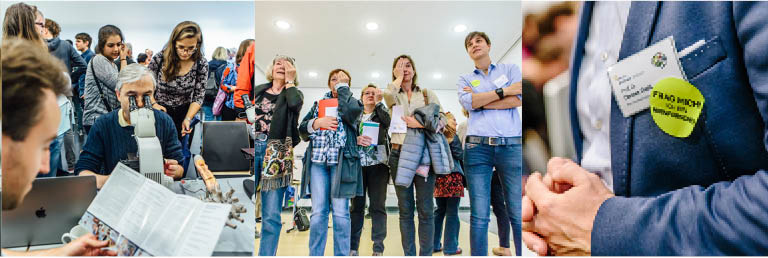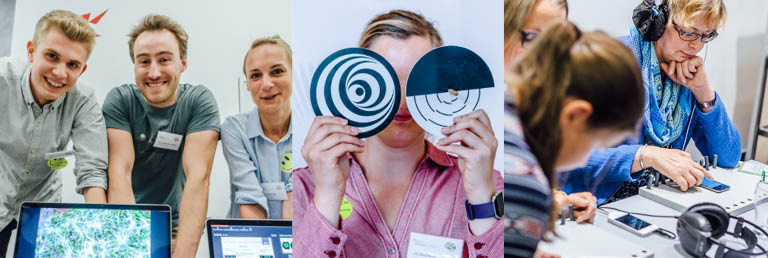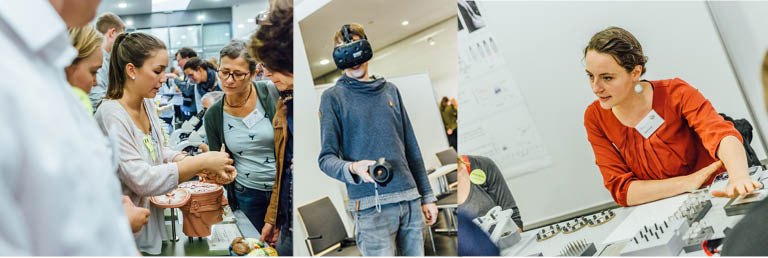BRAIN DAY 2018 – Programme

FROM FUNDAMENTAL RESEARCH TO THERAPY
A day with a focus on Bochum’s neuroscience with lectures, information stands and activities.
19.09.2018, 1pm to 5pm, RUB Conference Center
PROGRAMME
| 13:00 | BEGINNING OF THE SUPPORTING PROGRAMME Presentations of support groups Activities to join in |
| 13:30 | WELCOME AND OPENING Prof. Dr. Denise Manahan-Vaughan, Speaker of Collaborative Research Centre 874, Ruhr-Universität Bochum |
| 13:45 | ADHS IS NOT A PASSING FASHION Prof. Dr. Tanja Legenbauer, Klinische Psychologie und Psychotherapie in der Kinder- und Jugendpsychiatrie, LWL Universitätsklinik Hamm, Ruhr-Universität Bochum |
| Read more The attention-deficit/hyperactivity syndrome (ADHS) attracts a lot of public attention. This attention usually centres on overdiagnosis, medication and the influence society, family or school might have on the disorder. Nevertheless, ADHS is no passing fashion. It is a neurobiological disorder that runs in families and requires treatment. Educational methods or media consumption do not cause the disorder, however, they play a significant role in its development. The talk will explain what an ADHS is, how it should be diagnosed, what treatment forms are available and how they work. | |
| 14:15 | ARE YOU REALLY TIRED OR DO YOU JUST THINK THAT YOU ARE? – On the role of sleep in our health and the ability of our body to find out how much sleep we need Dr. Lars Dittrich, Research Group Selective Vulnerability of Neurodegenerative Diseases, German Center for Neurodegenerative Diseases, Bonn |
| Read more Sleep is good for your health. There is mounting evidence that healthy sleep behaviour may delay neurodegenerative disorders such as Alzheimer’s disease. But what exactly is happening during sleep – what makes it so salubrious? How does our body know how much sleep it needs? Can it be wrong? The talk will outline the current state of knowledge on those questions as well as the latest research results. | |
| 14:45 | COFFEE BREAK + SUPPORTING PROGRAMME |
| 16:00 | THE PSYCHOBIOLOGY AND INTERDISCIPLINARY THERAPY OF CHRONIC PAIN Prof. Dr. Martin Diers, Klinische und Experimentelle Verhaltensmedizin, Klinik für Psychosomatische Medizin und Psychotherapie, LWL University Hospital, Ruhr-Universität Bochum |
| Read more Chronic pain is a severely impairing condition, which leads to high costs for the health care system; so far, however, it is not sufficiently treatable. The talk will discuss how acute pain is being processed in the brain and how the processing of pain stimuli in the brains of patients with chronic pain differs from that. Furthermore it will outline methods of treatment aiming at influencing those changes in the brain. | |
| 16:30 | BIRDS ARE DINOSAURS AS WELL AS CLEVER: How does this help us to understand our brain? Dr. Jonas Rose, AG Avian Cognitive Neuroscience, Institute of Cognitive Neuroscience, Faculty of Psychology, Ruhr-Universität Bochum |
| Read more In English the word ‘bird brain’ means an insult. The brain of birds has a different structure compared to the human brain and for a long time it was thought that accordingly birds could not be clever. This is wrong. The talk will give an insight into the bird brain and the intelligent behaviour of this last surviving dinosaur – and it will explain why examining this is important to us. |
SUPPORTING PROGRAMME

The neuroscientists from the Ruhr-Universität Bochum have come up with an exciting new programme and we would like to invite you to join us, test your brain cells and chat with our researchers. Where are hippocampus, cerebellum, or pituitary gland? Members of the Institute of Anatomy, Department of Cytology, will help you get oriented in the brain. Discover the most astonishing human organ under the microscope, through exhibits, and diagrammes.
One of the research projects of the Knappschaftskrankenhaus Bochum is a robotic arm that can be operated by paraplegics with their thoughts. Find out how “controlling with the force of the thought” by means of a computer chip in the brain works.
The significance of the sense of touch shows itself in phrases such as “handling a situation”, “being touched” or “feeling one’s way towards something”. If you have poor eyesight, you get glasses – but how do you notice and what can be done, if you lose your sense of touch? The staff of the Neural Plasticity Lab will show you how to measure and improve the sense of touch. Find out how easily the sense of touch can be “deceived”.
Not even our visual senses are infallible – you can test your own brain with our optical illusions. Scientists of the Department of Neurophysiology and the research group for advanced fluorescence microscopy will guide you through the fascinating world of optical illusions and explain how they work.
Scientists of the Uniklinikum Bergmannsheil who specialise in neurological research are not only exploring the sense of touch and the motoric multi-tasking capability of the arms, but also higher abilities such as identifying unknown objects. Furthermore they investigate how learning leads to modifications in the brain, using magnetic resonance imaging (MRI). Try out how the categorisation of 3D objects and the perception of touch work and learn about MRI.
Stimulating neurones without operation – that is possible with transcranial magnetic stimulation (TMS). The staff of the Department of Neurophysiology will show you how this painless method of brain stimulation can help with examining and treating brain disorders.
INFORMATION STANDS OF THE SUPPORT GROUPS

Alzheimer Gesellschaft Bochum e.V./ Demenz-Servicezentrum Ruhr
Autismus-Therapie-Zentrum Dortmund und Hagen
Clusterkopfschmerz-Selbsthilfe-Gruppe Recklinghausen
Epilepsie-Selbsthilfegruppe Essen
Deutsche Myasthenie Gesellschaft e.V.
Deutsche Deutsche Guillain-Barré Syndrom Initiative e.V.
Deutsche Restless Legs Vereinigung Bochum
Bundesverband Kinderneurologie-Hilfe e.V.
ADHS Deutschland e.V., Regionalgruppe Bochum
Deutsche Multiple Sklerose Gesellschaft, Ortsvereinigung Bochum und Umgebung e.V.
REGISTRATION
Participation is free of charge
Please confirm your attendance via
Sfb874-pr@rub.de
Or Phone: 0234 32-26675
DIRECTION
Public Transport subway U35 exit “Ruhr-Universität Bochum”, enter through Mensa (university cafeteria)
Download detailed directions here. (in German)
Car: via Universitätsstraße, Parking Deck P9, then follow signposts
Download Map Directions here.
